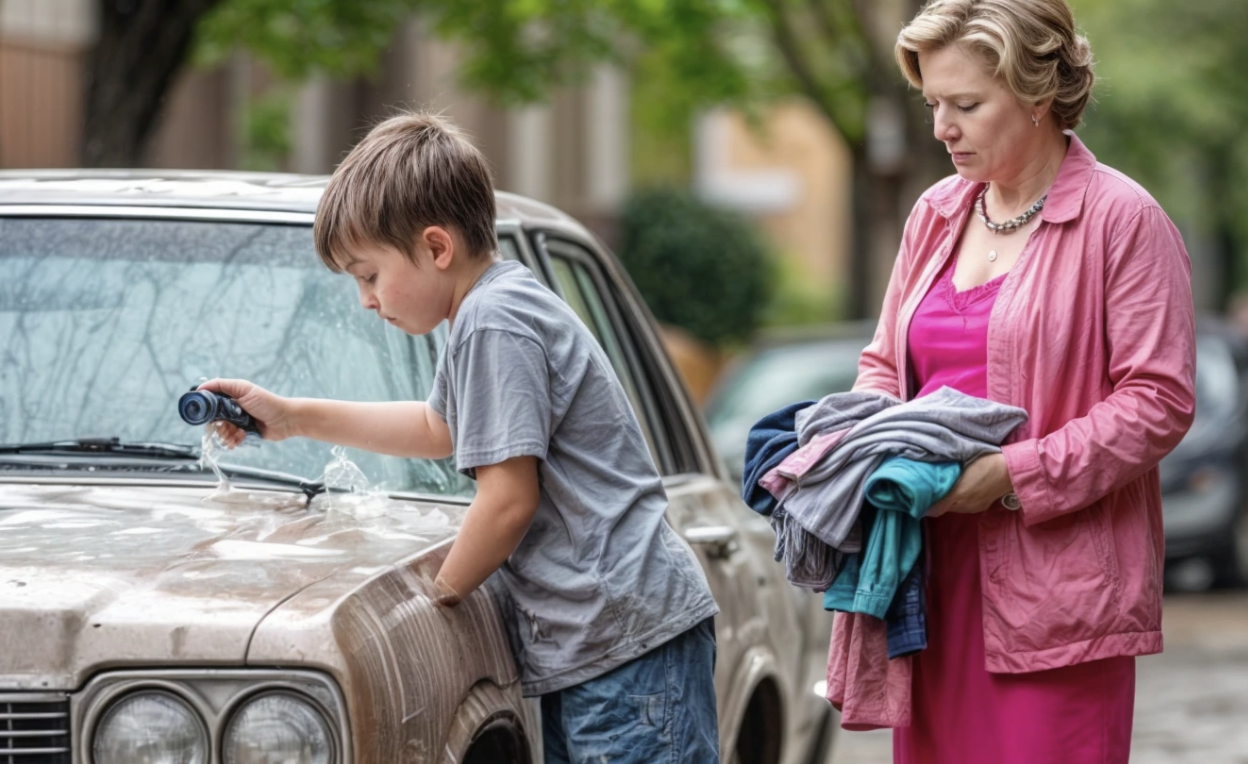In the backyard of the city hospital, in the shadow of gray concrete walls and under the sound of rare drops falling from the roof after rain, a boy often appeared — thin, as if woven from wind and loneliness. He was about ten years old, no more, but in his eyes already lay the fatigue of an adult who had endured too much. He did not stand with outstretched hands, did not steal, did not shout, did not cry. He simply worked. From morning till evening, in rain and frost, he washed the cars — doctors’, nurses’, orderlies’. Scraping the dirty wheels with a brush, rinsing rags in a bucket, patiently cleaning stains off the sides of the cars, as if each one were the last hope for a piece of bread. For this, coins were tossed to him, sometimes a piece of Borodinsky bread, leftover soup, or a bun from the hospital canteen. He accepted it without thanks, but with deep, almost religious respect for kindness, as if each piece was not just food, but proof that the world had not yet completely gone dark.
Orderly Galina Stepanovna had been watching him for a long time. From the first time she noticed his bare, frozen feet on the asphalt, she felt something twitch inside. The boy was barefoot, wearing a torn sweater, his pants held up by a single string, but his gaze was clear, firm, as if forged from steel. He did not ask. Did not complain. Did not cry. He just was. And in his silent presence was such strength that every time Galina looked at him, she felt her heart tighten with pain and admiration simultaneously.
One day, after a twelve-hour shift, when her body ached with fatigue and her soul begged for rest, she saw him again by the service entrance. The wind cut her face like a knife, and the boy stood by the last car, trembling all over, his fingers blue from the cold, yet he was still wiping the hood with a rag, as if his life depended on it.
“Little one,” she said quietly, stepping closer, “you’ll freeze to death here! Why do you torment yourself like this?”
He looked up at her — dark as night eyes, but a fire burned within them.
“I’ll endure, auntie,” he whispered, “just two more cars — and I’ll buy bread. It’ll be enough for the day.”
She wanted to take his hand, but he pulled away — not out of fear, but pride. He did not ask for help. He deserved it.
That night, in ward number 14, an old man died. Pyotr Sergeyevich Vasilyev. Alone. Without relatives. Without cries or tears. Only the nurse recorded the time of death, and the body was taken to the morgue. And the belongings — an old coat, faded trousers, a worn-out shirt — remained lying in the locker. Galina passed by, looked at them, and her heart tightened. She knew those things would be thrown away. And the boy — shivering outside.
She hesitated for a long time. Then, gathering everything into a bag, she went outside. Found the boy near the bucket. Handed him the bundle.
“Here… for rags,” she said, looking away. “Maybe you’ll need them.”
He took the bag carefully, as if inside was not clothing, but fragile hope. Unfolded it — and froze. The coat was old but intact. Almost new, if not for the time.
“Thank you…” he whispered. “I can wear it. And it… isn’t torn?”
“Almost new,” she replied. “Grandpa was neat. Very.”
He nodded. And for the first time ever — he smiled slightly.
A week passed. Then — he appeared again. But now he was wearing the coat. It hung on him like on a hanger, but it was clean, washed, carefully darned at the elbow. He approached Galina, eyes shining like stars in a dark sky.
“Aunt Galya,” he said, trembling with excitement. “Did you know grandpa had a note in his pocket?”
“What note?” she asked in surprise.
He pulled a folded piece of paper from the inside pocket of the coat — yellowed, with faded ink. Carefully unfolded it. On the paper was a clear, elderly handwriting:
“If you found this — it means you are alive. Live honestly. I could not do anything — maybe you will. The things are yours. And forgive me if you are my grandson…”
Galina staggered. Sat down on a bench. Her heart pounded. Because she remembered. Before his death, the old man grabbed her hand and whispered with a trembling voice:
“I lost everything… I didn’t even find my grandson…”
“What is your name, boy?” she asked, barely breathing.
“Artyom… Artyom Vasilyev.”
At that moment, the world around froze. As if time curled into a ball, and past and present met at one point. Galina looked at him — at his face, at the features that seemed imprinted in Pyotr Sergeyevich’s memory. A puzzle formed in her mind: the surname, the age, the coat, the note, the photo that the old man kept in the nightstand. And this boy — barefoot, hungry, but with such strength of spirit that it was impossible not to believe: he was here for a reason.
She stood up. Straightened up. Her eyes became hard as steel.
“Let’s go,” she said. “First, we’ll eat. Then — we’ll look for documents. Maybe you really didn’t just find that coat by chance. Maybe fate brought you here.”
In the hospital cafeteria, amidst the smell of mashed potatoes and cheap soap, Galina sat Artyom at a table. She nodded to the cook. A minute later, hot soup, a sandwich with sausage, and a cup of tea with honey stood before the boy. He ate slowly, carefully, trying not to make noise, not to rush. Every bite — like a gift.
“Artyom,” Galina asked, “where are you from? Where are your parents?”
He lowered his eyes. Lips pressed tight.
“My mom died. Long ago. I don’t know my father. I lived with grandma… she fell ill. Then she died. Since then — alone. I don’t want to go to an orphanage. They beat there. I ran away. Slept at the station, then came here. Doctors don’t chase me away. They even give me food.”
Galina closed her eyes. Everything fit. No documents, no relatives. Only a coat with a note. And a boy who might be — the grandson of the dead old man.
“Have you ever heard the surname Vasilyev before?” she asked.
“Grandma said, ‘Artyomka Vasilyev, like your dad was.’ But I didn’t know dad. Only had a photo… lost it.”
“And grandpa…” Galina paused. “Pyotr Sergeyevich Vasilyev. Have you heard of him?”
Artyom shook his head.
Half an hour later, Galina returned with a worn folder. Inside — a copy of a passport, a certificate with an address, and… a yellowed photo. A man in his youth, with the same eyebrows, the same cheekbones.
“Do you recognize him?” she asked, handing over the photo.
The boy shuddered. His eyes filled with tears.
“That’s… dad,” he whispered. “Grandma had the same photo.”
From that day everything changed. Galina took him to the head nurse, then to the guardianship authorities. A surgeon who had known Pyotr Sergeyevich for many years went with them. The paperwork took a month. But from the very first night, Artyom slept in a warm room, in a clean bed, under a blanket that smelled of laundry detergent and home.
Six months later, he started school. With a new backpack, shiny notebooks, in a clean uniform. And in his pocket — the note folded in quarters from his grandfather. His talisman. His legacy. His beginning.
But one day Artyom disappeared.
The day after the talk about documents — he was gone. Neither by the entrance nor in the parking lot. Galina waited. A day. Two. Asked everyone — guards, cleaners, doctors. No one had seen him. Only the old watchman said:
“Early in the morning, in the fog, a boy got on the train. Looks like yours.”
Her heart sank. She understood: he was scared. Too much at once — grandpa, the coat, hope. He was used to running away. To disappearing. To not becoming a burden.
Months passed. Winter locked the city in ice. Galina kept working. Sometimes she found time to reread that very note — the one grandpa left in the pocket. She kept it in a drawer with bandages, as if it was not a piece of paper, but a heart left behind by a person.
Then — spring. First puddles, first thaw. And one morning — on her desk lay an envelope. Without a return address. Only her name — in a child’s handwriting.
She opened it with trembling fingers.
Hello, Aunt Galya.
This is Artyom.
I left because I was scared. You were kind to me, but I… couldn’t stay. But I have not forgotten. I keep the note. I believe he really could have been my grandpa.
I found work with kind people. Washing dishes in the cafeteria. They gave me a room. I am learning to read — by signs, by books. I am 11.
When I grow up, I will come back. For sure.
Thank you.
Your Artyom.
Galina read the letter ten times. Then placed it in the folder next to Pyotr Sergeyevich’s note. She sat for a long time. Then quietly said:
“Live honestly, Artyom. Just live. And maybe you really are a grandson. Or maybe you’re just a person who was given a chance. And that… is more than enough.”
Not all children stay close.
But if you have sown kindness in your heart — it will not disappear. It will go with them on a train, to another city, another life. And one day — it will rise.
Even after years.
Even in a foreign land.
Even without words.
Sometimes, to start a new life, you only need —
an old coat,
a forgotten note in the pocket,
and one kind heart
that did not pass by.


